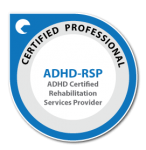

After ADHD is diagnosed, I have heard many parents say that they were given an option for medication and sometimes counseling, but that they were not informed about how executive functioning skills are a major part of the ADHD diagnosis. It may take years to realize that your child is struggling in this way, and when you finally do, it feels like you found the missing link that you have been searching for.
Executive functioning skills are developed in the pre-frontal cortex of the frontal lobe part of the brain. They take up to 24 years to fully mature and develop. They are responsible for higher level problem solving, self-awareness, and planning and prioritizing. They are what we rely on to manage emotions and inhibit impulses, organize both material items and thoughts, and manage our time wisely and independently. Executive functioning skills are what we need to begin and persist through challenging tasks, to learn from previously made mistakes, and to maintain focus despite competing factors for our attention.
Deficits within these skills may show up as difficulty getting motivated and following through with tasks, especially those that are challenging or boring, but often even with regular daily routines. There may be problems following multi-step directions or remembering a sequence of activities such as the steps needed to complete a chore, or to access an online resource. They may show up in big emotions, impulsive behavior, and being rigid and inflexible with unexpected changes. They may result in explosive incidents at home and/or school, constant conflict with parents, difficulty keeping friendships, and a cycle of trying to reward and punish your way out of your child’s difficulties. They manifest into problems at home, school, work, and with social skills. They bleed into every aspect of your family if left unchecked. And, most unfortunately, they won’t magically improve only with age.
The executive functioning skills begin developing in infancy, and they are shaped by our experiences. Communication, social interactions, emotional experiences, participation in sports, music and other extracurriculars, being read to and using imagination, engaging in constructive, artful, and pretend play, and academic learning experiences all contribute to how a child’s frontal lobe grows and develops until maturity. Neural connections are being made from the moment we are born, and our brains develop strong connections to what we focus our attention and energy on. When neurons “fire” during any and all experiences, they are then “wired” into the brain. There is a saying that “what is fired together, is wired together”. Repeated firings of adaptive or maladaptive input will have a long-term effect on the wiring in the brain. This is why once maladaptive responses have begun, they will not reverse themselves without help. This also explains how early trauma, even if a child does not remember it, comes back later to affect them.
When children are young, it is the parent’s and caregiver’s job to be the substitute frontal lobe, helping children learn how to manage emotions, to problem solve, and to organize and plan. Parents manage time for their children, give them the solutions to their problems, and provide external motivation in the form of sticker charts, treats and monetary rewards. Children learn to trust that a certain behavior will produce a good result for them, so they continue to try to meet the expectation of that behavior. If it is easy enough to do, and they have the skills necessary, they continue to experience good outcomes. They are capable of meeting a certain expectation, and the parent(s) need not worry about it. However, when a child tries to meet an expectation or earn a reward for a behavior, but cannot, they experience negative outcomes, such as punishment, anger and frustration, and/or a developing pattern of low self esteem that leads to a further spiral of challenges.
It is not only nurture that contributes to the growth and development of executive functioning skills. Research shows that children who have ADHD or other diagnoses especially struggle with these skills, regardless of the support and efforts of their parents. Maturity of some of the skills may lag behind others, or your child may not get a chance to grow and develop them if they were not given opportunities to use them. These children may be trying to meet an expectation, but they cannot, regardless of threats of punishment or enticements of rewards. The reason? They are lacking the executive functioning skill that the expectation demands.
The good news is that executive functioning skills can be strengthened at any age. They are the link between thinking and doing. Committing to improve requires awareness of one’s weak areas, and a willingness to make some changes, but I have found that kids and teens who struggle in some of these areas do want to do better, but they do not know how. Instead of saying “try harder”, I would say, “try something different”. We are not all wired the same way. We each have a unique combination of strengths and challenges in all areas of our lives. For the remainder of this blog, I will briefly discuss each executive functioning skill and how to help your child, tween or teen strengthen it.
Response inhibition, otherwise known as impulse control, is the ability to think prior to speaking or acting. It requires that we have some knowledge of likely outcomes of our behavior, and that we have considered a range of possible choices prior to saying or doing something. This is a foundational executive functioning skill, but one that continues developing into young adulthood. Playing strategy, card and board games that require waiting for turns and thinking ahead to the next move is an excellent way to practice impulse control. I also teach kids and teens to pause by imagining a pause button somewhere on their body, then tapping it to give them more time to process and decide in the thinking part of the brain.
Emotional control is the ability to “keep it together” in the face of large or small challenges to one’s emotions. It requires that one is able to recognize emotions that tend to be maladaptive, and to have and use strategies to process the emotion in a productive way. Emotional control is also a foundational executive functioning skill that needs to be managed and maintained throughout the entire lifespan. By the time we are adults, many of us have figured out strategies to do just that: deep breathing, walking away from triggering situations, exercise, meditation, journaling, engaging in counseling, calling a friend, and more. Kids also have these options available to them. It begins with naming the feeling or emotion, then processing it by engaging in a healthy choice.
Flexibility refers to the cognitive ability to shift from one idea or mindset to another in the moment. Some people can naturally go with the flow and are not shaken by the unexpected or spontaneous challenges that life throws us. Some people crave routines and familiarity and can be quite rigid in thought. Improving this executive functioning skill requires a conscious effort to be flexible in the face of a challenge. This may look like engaging in “mind over matter” self-talk or having an adult model flexible language and actions.
Working memory is about holding pieces of previously learned information in the brain and accessing them when needed. Think often used recipes, rules of a game, directions to a friend’s new house, math equations and how to get onto Zoom or Google Meets. To develop this executive functioning skill, you might begin with writing down or speaking out loud the steps of something new until you have it mastered.
Organization refers to not only the organization of things, but of thoughts. Strengthening the executive functioning skill of organization is not as simple as placing items into folders or labeled bins. I encourage my clients to dig deeper into discovering what makes the most sense for them, and what they can keep up with. Organization of thought might be needed for a research or persuasive essay, for an oral presentation, for answering questions in an interview, or for carrying on daily conversations in a way that other people can follow and understand. To strengthen this part of the organizational system in the brain, we can use the strategy of outlining or practicing answers to questions that may be asked.
Goal-directed persistence is the ability to stick with something through all the steps until completion. This executive functioning skill is especially challenging if one encounters a barrier that makes it difficult to continue or lacks motivation to complete the task or chore. An individual who struggles in this aera may give up easily if too challenged or bored. Finding motivation for the goal is important, along with using strategies such as self-talk (“I can do this”) and having a mental or physical picture of what “done” looks like. Strengthening this skill requires the ability to handle some discomfort in exchange for the desired outcome.
Time management is a self-explanatory executive functioning skill but being able to efficiently manage one’s own time is not intuitive for many individuals – including adults! To strengthen this skill, we can begin by becoming aware of how we spend our time, how long unscheduled tasks take (like homework or chores) and what we do with our free time. There are many apps, timers, and visual aids to assist in being able to stay on target, but one skill that I like to emphasize is to honor the commitment you made to yourself. If you say you are going to do something at a certain time, be sure to do it. If you plan to be out the door at a specific time, make it happen. This requires a conscious effort of bringing the task up to the frontal lobe of the brain rather than going through the usual motions in automatic mode. This is one of the skills that requires work but is fairly simple if one is motivated to getting a better handle on time management.
Task initiation refers to the ability to begin a challenging or boring, or even desired, task. Newton’s First Law, which states in part that an object at rest stays at rest unless acted on by an outside force, comes to mind here. This is about inertia! Clients who struggle with this executive functioning skill often tell me that once they can get going, they are often fine to complete the task. It is a matter of stopping the procrastination and convincing themselves that they must do the thing they are avoiding. Using the time management strategy from above, committing to a certain time to do something and doing it, will also help with this skill.
Planning and prioritizing involves being able to “see” the steps needed to complete a task and put them in an order that makes sense. Strengthening this executive functioning skill requires practicing writing steps and deciding which is first, second, third, etc. This skill can be applied to schoolwork, chores, or something desirable, like learning to cook a new recipe, redecorating a room, or planning a party. Beginning to work on this skill with low stakes tasks (not completing a major project for school) will help trial and error some strategies for prioritization.
Sustained attention is the ability to maintain focus in the face of competing stimuli or desires. Strengthening this executive functioning skill is not as simple as saying “just pay attention!” This skill requires the ability to filter distractions and continue to focus for the length of time demanded.
Problem solving is the ability to think critically through a problem or situation, to come up with multiple solutions, and choose the appropriate one. This executive functioning skill also requires that we have the ability to think on our feet, to not become paralyzed when stuck, and to re-set the course of decision making if it is not having the desired outcomes.
Lastly, self-awareness is the understanding of one’s own behavior and actions and being able to adjust them accordingly based on desired outcomes. This includes relationships and social interactions, as well as sport, academic or work performance. It is also awareness about one’s sensory preferences, learning styles, and personal strengths and weaknesses. Problem solving and self-awareness are two of the highest-level executive functioning skills, slowest to develop, but so necessary to be an independent and successful adult. I always tell my clients that they are unique individuals and by learning as much as they can about themselves is one of the best skills they can have.
Now that you have read through the executive functioning skills and a brief tip on how to strengthen each, I urge you to think about how they apply to the children (and adults) in your family. Where are the strengths? Where are the challenges? If you wish to take your middle or high school student deeper into understand their own strengths and challenges, including in executive functioning skills, study skills, and personal development, check out my online summer boot camps. I also have an upcoming parenting workshop specifically for parents of tweens and teens. Information and the sign up link can also be found on my website. If your child is of elementary school age and you want him or her to catch up on developing their weaker skills, you can learn more about how to help them in my online self-paced program. I am also available for one on one sessions with all ages.
I am passionate about helping everyone figure out what works best for them, so that they can improve their lives and be the most successful individuals that they can! A key piece of my work involves helping my clients understand the WHY behind the work. You can always book a phone consultation with me so we can talk about your specific needs.




Copyright 2024 © Kids Empowered 4 Life. All rights Reserved.
All information on the Website is presented as informational only and is not a replacement for therapy assessment, diagnosis, intervention, or medical advice. The information provided on the Website is provided “as is” without any representations or warranties, express or implied. Kids Empowered 4 Life assumes no responsibility for errors or omissions that may appear in the Website.